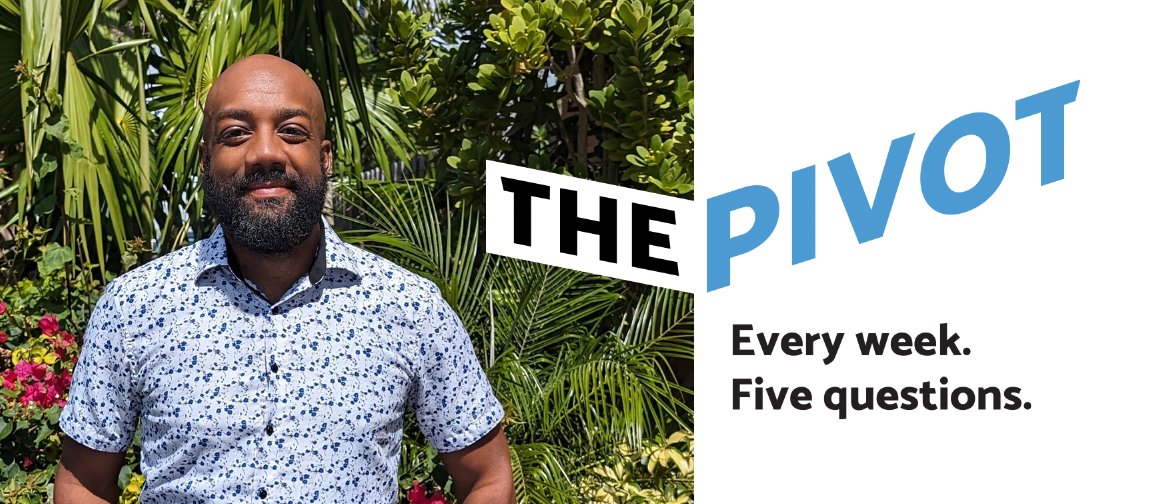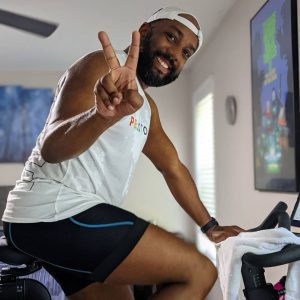The Pivot with Dr. Derrick Matthews

Dr. Derrick Matthews studies and supports LGBTQ+ health.

What’s your role in public health?
My title is director of research science at The Trevor Project. My role is to guide the scientific direction of the research team as we execute our primary goal: to produce research that supports the organizational mission of ending suicide among LGBTQ+ young people.
Because Trevor is not a research organization, but rather an organization that supports and utilizes research, it also means a lot of my role is interfacing with different departments across the organization. We now have multiple ongoing studies that are designed to not only contribute to knowledge about the health and wellness of LGBTQ+ young people, but also to support the work of our other teams such as Crisis Services, Public Training and Advocacy.
I am also an alum of the Gillings School’s Department of Health Behavior and I remain an adjunct assistant professor in the department.

Can you describe your focus area in one sentence?
I conduct research that explores how a variety of different factors influence the mental health and suicide thoughts and behaviors of LGBTQ+ young people.
That is a broad description but also exactly what keeps the work interesting — the diversity of topics that are relevant in the lives of LGBTQ+ young people and deserve serious study. I’m particularly interested in two specific topics, however.
The first is exploring how policy and the political landscape influence the mental health of LGBTQ+ young people, especially those who are transgender or nonbinary. Whether policies limit access to affirming care or restrict the ability of young people to fully participate in student life, they come with very real and measurable harms to health.
The second is making sure our research reflects the heterogeneity of queer experiences, especially as it relates to the intersection of race and ethnicity. Studies that intentionally recruit large numbers of people of color often still don’t have enough LGBTQ+ people for meaningful analysis, and the reverse is often true as well. Those who are the most vulnerable by virtue of having multiple marginalized identities, for example Black transgender women, are the least likely to be represented in research. Because our large survey studies only include LGBTQ+ young people, we have the rare ability to explore these topics and give voice to those whose experiences have gone misunderstood and misrepresented for too long.

What brought you to public health?
I was an English major at Rice University, and I thought I wanted to go medical school. One of my first summer internships was with a local organization, Healthcare for the Homeless – Houston, which is a federally qualified health center that provides a variety of medical services for people affected by homelessness. By the end of that summer, I was far less interested in being the one providing the clinical care. Instead, I was committed to learning more about organizations that provide care to underserved populations, about preventive health, and about ongoing measurement and evaluation activities.
I ended up at the University of Michigan to study for a Master of Public Health (MPH) degree — that’s where I narrowed my focus and interest on HIV prevention with sexual minority men. My MPH summer practicum coincidentally brought me back to Houston where I worked at the city health department’s HIV Prevention Program. As much as I loved the work, I was also frustrated that so much of the research we relied on to support same-gender loving Black men felt as if it was about us but not for us. (It was even more rarely conducted by us.)
Ultimately, my desire to produce this research myself is what led me to Gillings and then to pursuing a career in research as a faculty member. While finishing my postdoc at the University of Pittsburgh, I had an amazing opportunity to write a paper with other Black gay male colleagues. In it, we provided our critical analysis of the ways public health had really erred with HIV research in our communities and new paths we could take going forward. As much as I enjoyed all aspects of writing that paper, I especially loved that we made sure each section started off with a quote from a Black gay author, poet or activist.
Now, we have a well-read paper in the American Journal of Public Health featuring the names of Essex Hemphill, James Baldwin, Marlon Riggs, Bayard Rustin, Langston Hughes and Joseph Beam. In some ways, it’s a very small gesture; at the same time, it’s a profound one. I often think of it when I’m asked about why I got into public health.

How have you pivoted during your public health career?
I would say a small pivot started in my doctoral program. I lived in Boston for one month in the summer of 2010 so I could attend the Summer Institute in LGBT Population Health run by The Fenway Institute. That experience gave me the additional substantive knowledge, methodological skills and — most importantly — a cohort of colleagues who enabled me to pursue LGBTQ+ health research in a real way for the first time. While my primary research agenda was in HIV prevention, since that moment, I have remained active in LGBTQ+ health research more broadly.
The larger pivot happened when I decided that spring 2022 would be my last semester as a full-time faculty member. I will always value my time in that role, but it was becoming increasingly clear to me that my passion for doing research in a university setting had waned. I was fortunate enough to try out a few other positions afterward, and I gained some crucial skills in project and people management before arriving at my current role at The Trevor Project.
There is a whole different set of challenges that comes with doing research outside of academia, but it also comes with new opportunities I’ve been very excited for. The pace and process of research is wildly different and, in my current position, I can see firsthand how our different outputs get used to create change. For example, we produced an internal report that our Advocacy team used in their recent conversations with policymakers about actions they could take to support transgender and nonbinary youth in their state.
I would never have guessed that my relatively small pivot in broadening my research focus would ultimately enable the larger change years later.

Who are you when you’re at home?

Dr. Derrick Matthews works out at home.
I moved to south Florida about a year ago. Before I knew it, I became a frequent beach goer, even if it’s just to enjoy a nice walk. I love spending time outside and will frequently take my laptop out to enjoy a nice day in front of a coffee shop or by the pool while getting some work done. Ironically, at the same time, I’ve really gotten into home workouts. It’s been a fun journey learning how much you can do to build strength and endurance from your living room!
I think my friends would tend to describe me as pretty social. Now that I work from home, it doesn’t take a lot of prodding to get me out, especially if food is involved. That said, I also very quickly revert to my more introverted self, and you are just as likely to find me at home reading or playing video games. I am an enormous video game nerd, and here’s the proof: I have an 8-bit pixel art tattoo of the Black Mage from the original NES-version of Final Fantasy!
Read more interviews in The Pivot series.
Published: June 27, 2024
